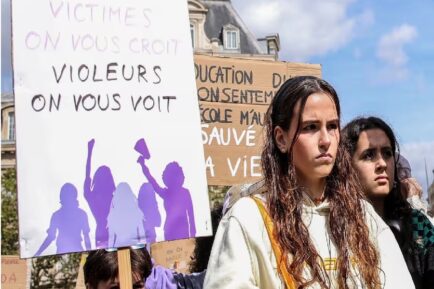Can you write a scary story that was read to you when you were little, but in a funny way? A sentence containing the word sea? A letter to your Moria-dwelling self? Can the women who made the long journey of uprooting, who survived serious incidents of gender-based violence, and now live in difficult conditions in the Lesvos camp, feel better through writing?
These questions will be answered by Maria Tzavara, coordinator of the Lesvos Group of the Diotima Center, presenting the creative writing workshop that she organizes – since June – every week in Moria.
The workshop, attended by French-speaking women mainly from Cameroon and Congo, is implemented by the Diotima Center and supported by the United Nations High Commissioner for Refugees (UNHCR GREECE).
The goal “is the activation and empowerment of women, the expression of their collective voice, communication with other women, but also with the local community through the possible publication of their texts.
In addition, as the living conditions in the camps take up a lot of the women’s energy, thinking, and emotions, writing about what happens there can make everyday life better,” says Maria.
Unfolding the course to the island
Each workshop includes 3-4 rounds of meetings, attended by a closed group of 10-15 women. But let’s let Maria take the floor:
The idea came out of the blue at an information meeting on legal issues and refugee rights. One of the women who participated was frantically taking notes. We asked her if she writes poetry, and she laughed. “No, I’m noting what you tell us. So that I don’t forget.”
But what would it be like if they wrote their own words themselves? “Would you participate in something like this”? we ask. Almost all of them look interested. We talk about it.
Have 2-3 hours every week, to write through exercises, write real and imaginary ideas, thoughts, and stories, describe images from the past and present and talk about the future as well. In other words, to try to reconstruct and connect parts of their journey here, on the island, in the country.
After all, there is not only the present tense and the status of asylum seekers or refugees. They are daughters, mothers, sisters, wives, and partners, they are women with a past, a present, and a future. Let’s see how we can remember this.
This is how the idea came about and its implementation began immediately. We set the first meeting (12/6/19) in Room 1 of Section C. Initially 17 women attended. Sometimes with enthusiasm and sometimes with skepticism “and now what?”. The 15 stayed and continued.
Taking back control, through writing
At each meeting, the plan unfolded. Emotions are always mixed. Because of the conditions. There. Here.
At one of the meetings, we found them all mourning. The day before, a boat had sunk offshore and people had died, among them a woman whom some of them had met in Turkey.
They wrote a lot that day, about sea monsters, about sorrows, about death but also about life and about swimming that they want to learn so as not to be afraid.
Along the way, another aspect of their lives in the Moria camp was revealed, where writing could play a positive role: Could the women regain some control over their lives, perhaps for the first time? To talk about what they define? To speak loud enough to be heard by the ears they desire?
Because when you write, you can control the beginning, middle, and end of a story. Talk about real stories or fictional ones or a combination of both. Be in control.
We started that afternoon with 12 women. Two cats found outside the door caused a bit of a stir, as cats crying is a bad omen in some African countries. We quickly got them out of the way so we could get started.
Words smooth, tender, and sad
We gave them blue notebooks and pens. They wrote their name on it and then they wrote more. And they didn’t stop.
Some women said that they now write alone at night and wake up with memories that they had repressed and that their memory is finally working and they are happy – even if they are sad – because sometimes their memories are difficult.
And then – in a meeting – after they wrote “a story that once scared them but written in a funny way” as the exercise wanted, they wanted to go on a trip and maybe for a swim. To go out to the city they did not know.
But this weekly writing gathering also did something else. It brought them together in a whole new way. It taught them to see things in each other that they would hardly see otherwise. Maybe it made some of them understand how common their problems are.
Between sighs, anger about the “wait” (that’s what the French-speaking women in Moria call the paper with the lifting of the geographical restriction in fluent Greek) that they don’t get, fights in the wing, unbearable heat, joys about the “wait” that someone stopped waiting for because surprisingly she took it, jealousy because why did she got it and not me, anxiety for what is to come, anticipation for the next trip.
And in between the words, some with sails and others damaged, smooth and sharp, tender and sad but all in their own land and in their own sea.





